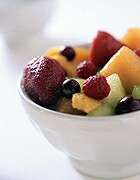Schools that use fruit slicers to pre-slice fruit report increased fruit sales, more fruit eaten, and less fruit wasted, according to a study published in the May issue of the American Journal of Preventive Medicine.
(HealthDay)—Schools that use fruit slicers to pre-slice fruit report increased fruit sales, more fruit eaten, and less fruit wasted, according to a study published in the May issue of the American Journal of Preventive Medicine.
To examine the impact of offering pre-sliced fruit in schools, Brian Wansink, Ph.D., from Cornell University in Ithaca, N.Y., and colleagues randomly assigned three schools to serve apples in slices while three schools served as controls and served apples whole. In treatment and control schools, sales, consumption, and waste of apples were recorded.
The researchers found that there was a significant, 71 percent increase in the average daily apple sales in schools that used fruit slicers compared with control schools. In schools that served pre-sliced fruit, the percentage of students who selected apples and ate more than half increased significantly by 73 percent, while there was a significant, 48 percent decrease in the percentage that wasted half or more.
"Sliced fruit is more appealing to children than whole fruit because it is easier and tidier to eat," the authors write. "This study applies the principle of convenience from behavioral economics and provides an example of a scalable, low-cost environmental change that promotes healthy eating and decreases waste."
More information:
Abstract
Full Text (subscription or payment may be required)
Journal information: American Journal of Preventive Medicine
Health News Copyright © 2013 HealthDay. All rights reserved.


















